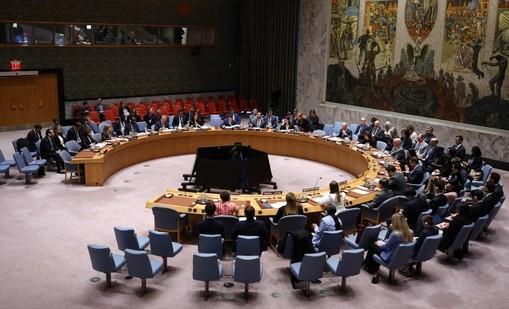
Was LeT involved? UNSC asks Pak on J&K attack, refuses to accept ‘false flag’ claim
In a recent development, the United Nations Security Council (UNSC) held a closed-door meeting at the request of Pakistan, where they refused to accept the country’s “false flag” narrative on the Pahalgam attack in Jammu and Kashmir. According to reports, UNSC members also questioned whether the terror outfit Lashkar-e-Taiba (LeT), which is based in Pakistan, was likely to be involved in the attack.
The Pahalgam attack, which took place on October 11, saw a group of terrorists open fire on a bus carrying tourists, leaving several people injured. The attack sparked widespread outrage and condemnation, with many calling for immediate action to be taken against the perpetrators.
Pakistan, however, has been quick to deny any involvement in the attack, claiming that it was a “false flag” operation designed to discredit the country. The narrative was met with skepticism by many, who pointed out that LeT has a history of carrying out violent attacks in the region.
The UNSC meeting, which was held behind closed doors, saw members questioning Pakistan’s claims and seeking more information about the attack. According to sources, some members of the council specifically brought up the targeting of tourists on the basis of religion, which has been a persistent issue in the region.
The meeting was seen as a significant development in the ongoing tensions between India and Pakistan, which have been escalating in recent months. The Pahalgam attack was the latest in a series of incidents that have sparked concerns about the safety and security of tourists in the region.
The UNSC has been a key player in efforts to address the situation in Jammu and Kashmir, which has been a disputed territory since India gained independence from British colonial rule in 1947. The council has held several meetings on the issue, with members calling for restraint and dialogue between India and Pakistan.
In the aftermath of the Pahalgam attack, India has been pushing for international pressure on Pakistan to take action against terrorist outfits operating from its soil. The UNSC meeting is seen as a significant step in this direction, with members refusing to accept Pakistan’s “false flag” narrative and questioning the involvement of LeT.
LeT, which is considered a terrorist organization by many countries, has been responsible for several high-profile attacks in the region, including the 2008 Mumbai attacks that killed over 160 people. The group is believed to be based in Pakistan and has received support from elements within the country’s military and intelligence agencies.
The UNSC meeting comes at a time when tensions between India and Pakistan are at a boiling point. The two countries have been engaged in a war of words, with India accusing Pakistan of supporting terrorist outfits and Pakistan denying the allegations.
The Pahalgam attack has also sparked concerns about the safety and security of tourists in the region. The attack was seen as a direct challenge to India’s efforts to promote tourism in Jammu and Kashmir, which has been a key sector in the region’s economy.
In the aftermath of the attack, India has been working to reassure tourists that the region is safe and secure. The government has also taken steps to increase security measures, including deploying additional troops and police personnel to the region.
The UNSC meeting is seen as a significant development in the ongoing efforts to address the situation in Jammu and Kashmir. The council’s refusal to accept Pakistan’s “false flag” narrative and questioning of LeT’s involvement is a clear signal that the international community will not tolerate terrorist activities in the region.
As the situation continues to unfold, it remains to be seen how Pakistan will respond to the UNSC’s demands. Will the country take concrete action to address concerns about its support for terrorist outfits, or will it continue to deny any involvement in the Pahalgam attack?
Only time will tell, but one thing is certain – the international community will be watching closely to see how Pakistan responds to the UNSC’s demands.



